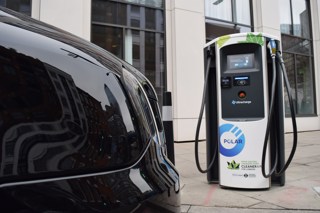The GMB union is calling on the Government and National Grid to invest now and upgrade infrastructure to ensure Britain is ready for mass adoption of electric vehicles (EVs).
According to one National Grid forecast there will be up to 35 million pure electric vehicles on the roads by 2050, with sales of conventional new petrol and diesel cars halted by Government in 2040.
That scenario sees peak demand from electric vehicles rising by 30 gigawatts — the equivalent of 10 new Hinkley Point power stations — adding to a current peak demand of 61GW, says GMB.
Justin Bowden, GMB national secretary, said: “The number of electric cars on our roads is set to rocket to anything up to 35 million, necessitating massive changes to network supply and charging point access.
“National Grid is forecasting up to 30 gigawatts of additional electricity capacity being needed by 2050 to meet peak demand. Our current capacity is 61 gigawatts.
“GMB is calling on Government and National Grid to plan and invest now in major infrastructure upgrading and development to ensure we are ahead of the curve.
“With the existing nuclear fleet reaching the end of its natural life over the next ten years, and coal being removed by 2025, an increase in electricity demand of 30 gigs translates into an awful lot of additional power stations.”
GMB’s call for urgent action comes as MPs on the Business, Energy and Industrial Strategy Committee questions Ofgem, National Grid and the Energy Networks Association as part of its inquiry into developing the market and infrastructure for EVs.
The session today (Tuesday, March 27), which starts at 10am, will focus on how an increased uptake in EVs will impact on the electricity grid and how new electricity infrastructure to mitigate these impacts can be sustainably funded.
Members are likely to ask about the main challenges electric vehicles present for the electricity grid, how extra capacity can be managed, and planned investment.
The Electric Vehicles: Developing the market and infrastructure inquiry is exploring the role of electric vehicles in the transition to a low carbon economy.
It is investigating the actions needed to support the development of the electric vehicle market, the challenges that electric vehicles represent for the electricity grid, and industrial opportunities for the automotive sector.
North of the border, Scottish and Southern Electricity Networks (SSEN) has launched a consultation on Managed Electric Vehicle Charging, seeking views on proposed solutions to help avoid potential overloads on local electricity networks caused by sharp increases in the use of electric vehicles.
The consultation forms part of SSEN’s Smart EV project, undertaken alongside technology partners EA Technology and supported by GB distribution network operators.
The project, funded by Ofgem’s Network Innovation Allowance, set out to review and research charging solutions that will allow the transition to EVs to take place with minimum disruption to customers and avoiding unnecessary network reinforcement.
The primary focus of the consultation is to seek views on an interim solution to address emergency situations, where local networks have faulted, or are likely to fault, based on a rapid increase in demand.
The proposed solution involves installing a device at both the local substation and, as an option, in domestic properties to monitor load and temporarily adjust EV charging where required.
Stewart Reid, head of innovation at Scottish and Southern Electricity Networks (SSEN), said: “Through the Smart EV project, SSEN is working ahead of need to develop a cost-effective, readily-deployable solution to address the challenge of clusters of EVs on our local electricity networks, until such time as long-term market solutions are suitably established. We welcome any views through the consultation process.”
Tim Nicklin, chair of the Society of Motor Manufacturers and Traders (SMMT)’s EV Technical Working Group, added: “SMMT welcomes the Smart EV project and its engaged approach to finding suitable technical solutions. We need to make sure that any solution adopted by industry is future-proof and works with and for the EV driver.”
The SSEN consultation closes on April 30.



















Login to comment
Comments
No comments have been made yet.